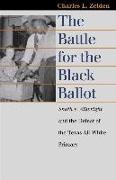- Start
- The Battle for the Black Ballot: Smith V. Allwright and the Defeat of the Texas All White Primary
The Battle for the Black Ballot: Smith V. Allwright and the Defeat of the Texas All White Primary
Angebote / Angebote:
The history of voting rights in America is a checkerboard marked by dogged progress against persistent prejudice toward an expanding inclusiveness. The Supreme Court decision in Smith v. Allwright is a crucial chapter in that broader story and marked a major turning point for the modern civil rights movement. Charles Zelden's concise and thoughtful retelling of this episode reveals why. Denied membership in the Texas Democratic Party by popular consensus, party rules, and, from 1923 to 1927, state statutes, Texas blacks were routinely turned away from voting in the Democratic primary in the first decades of the twentieth century. Given that Texas was a one-party state and that the primary effectively determined who held office, this meant the total exclusion of Texas blacks from the political process. This practice went unchecked until 1940, when Lonnie Smith, a black dentist from Houston, fought his exclusion by election judge S. E. Allwright in the 1940 Democratic Primary. Defeated in the lower courts, Smith finally found justice in the U.S. Supreme Court, which ruled 8-1 that the Democratic Party and its primary were not "private and voluntary" and, thus, were duly bound by constitutional protections governing the electoral process and the rights of all citizens. The real meaning of Smith's challenge to the Texas all-white primary lies at the heart of the entire civil rights revolution. One of the first significant victories for the NAACP's newly formed Legal Defense Fund against Jim Crow segregation, it provided the conceptual foundation which underlay Thurgood Marshall's successful arguments in Brown v. Board of Education. It was also viewed by Marshall as one of his most importantpersonal victories. As Zelden shows, the Smith decision attacked the intractable heart of segregation, as it redrew the boundary between public and private action in constitutional law and laid the groundwork for many civil rights cases to come. It also redefined the Court
Fremdlagertitel. Lieferzeit unbestimmt




